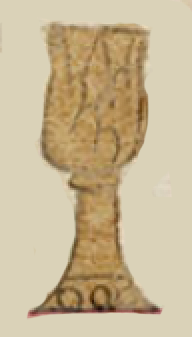caliz (CST12)
This painting of the simplex glyph for the term caliz, a loan from Spanish meaning chalice, shows a frontal view of a tall cup with a long stem and sculpting on the exterior. This cup was purchased for the local Catholic church.
Stephanie Wood
For more on the Codex Sierra, see Kevin Terraciano’s study (2021).
Stephanie Wood
ce caliz
Stephanie Wood
1550–1564
Jeff Haskett-Wood
calices, iglesias, compras

caliz (a loan from Spanish that entered Nahuatl), chalice, https://nahuatl.wired-humanities.org/content/caliz
caliz
Stephanie Wood
Códice Sierra-Texupan, plate 12, page dated [1]554. Origin: Santa Catalina Texupan, Mixteca Alta, State of Oaxaca. Kevin Terraciano has published an outstanding study of this manuscript (Codex Sierra, 2021), and in his book he refers to alphabetic and “pictorial” writing, not hieroglyphic writing. We are still counting some of the imagery from this source as hieroglyphic writing, but we are also including examples of “iconography” where the images verge on European style illustrations or scenes showing activities. We have this iconography category so that such images can be fruitfully compared with hieroglyphs. Hieroglyphic writing was evolving as a result of the influence of European illustrations, and even alphabetic writing impacted it.
https://bidilaf.buap.mx/objeto.xql?id=48281&busqueda=Texupan&action=sear...
The Biblioteca Digital Lafragua of the Biblioteca Histórica José María Lafragua in Puebla, Mexico, publishes this Códice Sierra-Texupan, 1550–1564 (62pp., 30.7 x 21.8 cm.), referring to it as being in the “Public Domain.” This image is published here under a Creative Commons license, asking that you cite the Biblioteca Digital Lafragua and this Visual Lexicon of Aztec Hieroglyphs.


